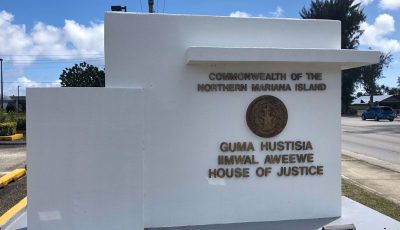Wiseman finds $170K as reasonable fee to lawyer, but not $782K
Superior Court Associate Judge David A. Wiseman yesterday found not reasonable a lawyer’s request for payment of $782,363.74 in legal fees for representing then-administrator of an estate that received a grand total of $2.8 million from the government for just compensation over the taking of property and rental payments.
Wiseman, however, determined that $170,263.01 is the reasonable fee and ordered the estate of Rita Rogolofoi to pay an additional $99,256.76 to attorney Brien Sers Nicholas for his legal services.
The judge said $99,256.76 is the retainer agreement fee balance after deducting the $71,006.25 previously paid to Nicholas.
In finding that Nicholas’ requested recovery of $782,263.74 was not reasonable, Wiseman ruled that Rita Rogolofoi’s heirs have not approved the contingent fee agreement between the lawyer and then estate administrator Enrique Seman.
Wiseman said the retainer agreement, as twice amended, does not contain a valid contingent fee agreement.
The judge further ordered that prior to said payment, administrator Clarence E. White shall submit, on or before Dec. 29, 2014, an accounting of funds available for distribution and pending obligations.
According to court records, in November 2004, then-administrator Seman retained the services of attorney Nicholas to represent him in Rita Rogolofoi estate’s probate matter and in the separate, but related action, the Board of Marianas Public Lands Authority versus the heirs of Rita Rogolofoi.
Seman and Nicholas executed a retainer agreement, wherein Seman agreed to pay the lawyer $175 per hour for his legal services on the probate case, and a contingent fee based on any recovery obtained in land quiet title action.
On Oct. 7, 2005, Nicholas and Seman signed an amendment to the retainer agreement. The amendment specifically stated that the fees listed in the agreement include representation “in any appellate proceedings and in any action or lawsuit wherein client is a party thereto in whatever capacity.”
On May 12, 2009, the Superior Court entered a judgment in favor of the administrator in the quiet title action, awarding the heirs to the estate of Rogolofoi fee simple ownership and titles to two lots containing some 33,927 square meters.
The heirs were also awarded a total of $2,690,020.07, which represented “just compensation” for certain government takings and rental payments collected by the Department of Public Lands, plus 9 percent post-judgment interest.
The total judgment award plus post-judgment interest came out to a grand total of $2,844,566.64.
Pursuant to the retainer agreement and negotiations with the administrator, Nicholas sought 30 percent of the grand total recovery for a total sum of $853,369.99 in attorney’s fees.
On Dec. 20, 2010, Nicholas and Seman entered into another amendment to the retainer agreement.
On March 12, 2012, Superior Court Presiding Judge Robert C. Naraja entered an order after a Jan. 4, 2011 hearing related to Nicholas’ fees.
The order stated that “if the heirs approve the contingency fee then so will the court. Otherwise, the court will conduct a further analysis to determine whether the retainer agreement is valid and whether the contingency fee is reasonable.”
The order concluded that claimant Nicholas’ petition was granted in part by “awarding counsel attorney fees in the amount of $71,006.25.”
The court, however, stayed “its order on the retainer agreement balance of $782,363.74, pending approval of the heirs.
Based upon the court’s March 12, 2012 order, the estate paid Nicholas in the amount of $71,006.25.
In 2013, Judge Naraja transferred the probate matter to Judge Wiseman.
Nicholas then filed a petition for instructions, requesting that the court address the matters regarding the remaining balance of his attorney’s fees claim in the amount of $782,363.74.
In his order issued yesterday, Wiseman said Nicholas failed to overcome the presumption that the subsequently entered contracts between Nicholas and administrator were invalid.
Wiseman said Nicholas twice amended the retainer agreement in this matter.
Therefore, the judge said, the issue is whether Nicholas made a sufficient showing of facts to overcome the presumption that he and the then-administrator Seman entered into invalid contracts.
“Here, the court cannot find in favor of claimant,” he said.
Wiseman said the 2010 amendment also affirms the contingent fee agreement at 30 percent the amount of recovery, and requires the estate to pay $853,369.99 to Nicholas.
Wiseman said while he understands that Nicholas’ modifications to the initial contract represent an effort to reduce the burden to the estate, the fact that the final invoice amount is $853,369.99 gives the court pause to question whether the 2010 amendment—and by logical extension, the original contingent fee agreement—were, in fact, valid attorney-client contracts.
Wiseman said Nicholas provided the court with explanations as to the terms of the retainer agreement, and as to the terms of the amendments, but little information as to how those contracts came to be.
Therefore, the judge said, he cannot determine whether the administrator agreed to the two retainer agreements amendments “freely and with a full understanding as to his or her rights, and after a fair and full disclosure of the facts.”
Thus, Wiseman said, the 2010 amendment to the retainer agreement raises a clearly legitimate question whether the contingent fee was consistent with the client’s best interest—and the interests of the heirs to the estate, whom the administrator owes a fiduciary duty.
Wiseman cited that ABA Model Rules of Professional Conduct, Rule 15 provides: “When there is doubt about whether a contingent fee is consistent with the client’s best interests, the lawyer should offer the client alternative bases for the fee and explain their implications.”
The judge said as Nicholas drafted the language to the 2010 amendment, he should have known what his fees would have been if they were based on his hourly rate.
“This court found that amount to be $71,006.25, calculated at claimant’s hourly rate of $175 for the 405.75 hours that claimant spent on the quiet title action,” he said.
Thus, Wiseman pointed out, the amount of money the estate agreed to pay Nicholas was more than 12 times the amount of money the estate would have paid him under his hourly billing rate.
Wiseman said he cannot say for certain whether Nicholas gave the administrator a choice to consider alternative fee arrangements in light of the potential for a substantial pay out from the estate funds.
Accordingly, the judge pointed out, Nicholas also failed to show that the $853,369.00 price tag for his legal services was not exorbitant, and that it did not exceed a fair and reasonable remuneration for the services rendered.
Wiseman said Nicholas carries a heavy burden to show that the amendments to the retainer agreement overcome the presumption of invalidity.
“Here, he did not meet this burden. Therefore, the court finds the contingent fee agreement to be invalid,” he said.
Wiseman said he gives credit to Nicholas for achieving in a jury trial the grand total award of $2,844,566.64 for the estate.
In addition, the judge said, the lawyer negotiated a stipulated dismissal of an appeal.
On balance, Wiseman said, he finds that Nicholas should be entitled to an additional award of $99,256.76 for a grand total award of $170,263.01.
The judge said Nicholas in a footnote of his memorandum proposes that he paid an additional sum of $99,256.76.



























